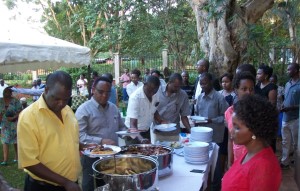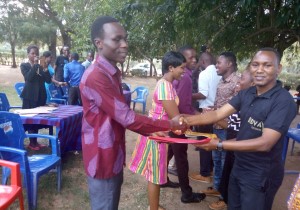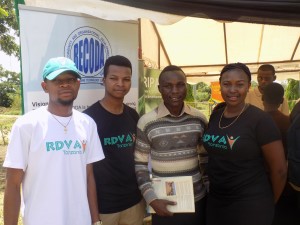1. Bachelor of Rural Development
The main aim of the program is to produce graduates who can perform a range of tasks and can be employed in development-oriented careers with specific focus on rural development. These include Policy Analysts and Planners, Programme Coordinators, Managers or Officers in both government and private organisations, development planners, trainers, researchers and consultants in training and research institutions, NGOs, CBOs and other rural institutions, and managers of Microfinance Institutions (MFIs).



This programme produces graduates who can perform a range of tasks and can be employed in development-oriented careers with specific focus on rural development. Graduates have broad and multiple skills to address a wide range of rural development issues
Semester 1
core courses: Principles, Theories and Contemporary Issues of
Development, Introduction to Economics
Agriculture and Rural Development, Introduction to Natural Resources
Management
Introduction to Psychology
Elective Courses: Introductory Sociology, Introduction to Agricultural
Economics and Development
Communication Skills, Tourism, Environment and Development, Principles
of Accounting
Semester 2
Core Courses: Rural Production Systems, Democracy & Governance,
Political Economy Science, Technology & Agrarian Development,
Communication Skills II
Elective Courses: Introduction to Agribusiness, Principles of
Administration and Management, Extension Communication and
Interpersonal Skills, Introductory Anthropology
Semester 3
Core courses: Introduction to Gender and Development, Natural
Resources Management
Rural Industrialization, Introduction to Social Science Statistics, Rural
Sociology
Elective Courses: Agribusiness and Entrepreneurship Development,
Agricultural Marketing Management, Extension Methods, Urban Rural
Interface
Semester 4
Core Courses: Demography and Population Studies, Public Policy, Cooperatives and Rural Development, Conflicts Management, Food and
Nutrition Security, Social Research Methodology, Field Practical Training
Elective Courses: International Relations & Economic Co-operation,
Promotion and Management of Community Organization, Environmental
Impact Assessment and Management, Extension Program Planning and
Evaluation
Semester 5
Core Courses: Gender and Development, Research Proposal Writing,
Designing of Development Projects
Introduction to Human Resources Management, Group dynamics and
Leadership
Elective Courses: Resource Policy, Legislation and Land Use Economics,
Community health and Health Promotion, Population and Development,
Participatory Methodology
Semester 6
Core Courses: Human Settlements and Ecology, Rural Finance, Poverty
Analysis, Project Appraisal, Monitoring & Evaluation, Research Report
Writing, Field Practical Training II
Elective Courses: Human Resources Management, Sociology of
Development, Value Chain Approach in Agriculture, Social Impact
Assessment
Career Opportunities
The programme produces graduates with contemporary knowledge and
skills to plan, manage and build communities’ capacity for development
interventions and improve people’s well-being in sustainable ways.
Therefore, BRD graduates are employed as Community Development
Officers, Policy Analysts and Planners, Programme Coordinators,
Managers or Officers, development planners, trainers, researchers and
consultants. Prospective Employers includes Government and Private
organizations, training and research institutions, NGOs, CBOs and other
rural institutions, and managers of Microfinance Institutions (MFIs)
More information please click Bachelor of Rural Development
2. Bachelor of Arts in Development Planning and Management
This programme produce graduates who have contemporary knowledge andskills to enable them plan and manage development interventions and build
communities’ capacity to also plan and manage such interventions so that the interventions can result in improvement of people’s well-being in sustainable ways.
Semester 1
Core Courses: Introduction to Development Planning and Management,
Introduction to Human Resource Management, Principles, Theories and
Contemporary Issues of Development, Basic Mathematics, Introduction to
Micro and Macro Economics
Elective Courses: Introductory Sociology, Computer Applications,
Communication Skills I
Semester 2
Core Courses: Planning Theory and Practice, Introduction to National
Development Planning, Principles of Management, Introductory Statistics,
Communication Skills II
Elective Courses: Development and Sustainability, Political Economy,
Introductory Anthropology
Semester 3
Core Courses: Agricultural Development Planning, Regional Development
Planning, Industrial Development Planning, Social Policy and Social Services
Planning in Development, Microeconomics
Elective Courses: Introduction to Gender and Development, Agricultural
Marketing Management, Entrepreneurship and Agribusiness Development
Semester 4
Core Courses: Urban Planning, International Planning and Development,
Public Policy, Social Research Methodology, Macroeconomics, Field Practical
Training I
Elective Courses: Introduction to Demography and Population studies,
Conflict Management, Environmental Impact, Assessment and Management
Semester 5
Core Courses: Integrated Planning and Management, Research Project I: Proposal Development, Human Resource Planning and Management,
Designing of Development Projects, Econometrics
Elective Courses: Gender and Development, Population and Development, Economic Development and Planning
Semester 6
Core Courses: Natural Resource Planning and Management, Public Finance Planning, Research Project II: Report Writing, Spatial Planning, Project
Appraisal, Monitoring and Evaluation, Field Practical Training II
Elective Courses: Agricultural Policy Analysis, Sociology of Development, Social Impact Assessment
Career Opportunities
The graduates work as leaders in development projects and organizations that aims for sustainable exploitation of resources for the betterment of
the society in diverse settings. They are employed in government and private organizations, training and research institutions, NGOs, CBOs and other
rural institutions, and managers of development projects nationally and internationally.
3. Bachelor of Human Resources Management and Labor Relations
This programmed produce experts that are made to be human resource officers, managers and labour officers with excellent ability to create and maintain friendly and productive work environment to increase human resource capital and labor productivity. The graduate are perfect in industries, agricultural sectors, government, international and non-governmental organizations. This programme produce graduates who have contemporary knowledge and skills to enable them plan and manage development interventions and build communities’ capacity to also plan and manage such interventions so that the interventions can result in improvement of people’s well-being in sustainable ways.



This programme produces experts that are made to be human resource officers, managers and labor officers with excellent ability to create and maintain friendly and productive work environments to increase human resource capital and labor productivity. The graduates are perfect in industries, agricultural sectors, government, international and non-governmental organizations.
Semester 1
Core Courses: Introduction to Human Resource Management, Introduction to
Labour Relations and Regulations, Principles of Records Management,
Principles of Accounting, Introduction to Ethics and Good Governance
Elective Courses: Principles, Theories and Contemporary Issues of
Development, Communication skills, Computer Applications
Semester 2
Core Courses: Principles of Management, Labour Relations Practices,
Employment and Labour Relations Acts and Laws, Administrative Law,
Communication Skills II
Elective Courses: Labour Relations System Actors, Workers’ Participation in
Management, Planning Theory and Practice
Semester 3
Core Courses: Introduction to Social Science Statistics, Strategic Human
Resource Management, Industrial Relations and Legislation, Organizational
Behaviour, Corporate Strategy and Planning
Elective Courses: Management of Human Resource in the Agricultural Sector,
Introduction to Gender and Development, Public Administration
Semester 4
Core Courses: Principles of Labour Inspection, Public Policy, Health and Safety
in Work Places, Social Research Methodology, Conflict Management and
Resolution in Workplaces, Field Practical Training
Elective Courses: Law of contract, Strategic Management, Customer Service
Management
Semester 5
Core Courses: Human Resources Training and Development, Research Project IResearch Proposal Development, Human Resource Planning and Management,
Human Resource Management Information Systems, Recruitment and Selection
Elective Courses: Organizational Development and Change, Gender and
Development, Group Dynamics and Leadership
Semester 6
Core Courses: Human Resource Management Practices, International Human
Resource Management, Performance and Reward Management, Research
Project II-Research Report Writing, Public Finance Planning, Field Practical
Training II
Elective Courses: Managing Public –Private Partnership, Organizational Policy
Formulation and Development, Budgeting and Accounting for Human Resource
Management
Career Opportunities
Graduates of this programme will have contemporary knowledge, skills and
competencies to plan and manage human resources and create conducive
employment relations in the work organizations that can lead to achievement of
organizational goals and objectives. Therefore, they are employed as human
resource officers, managers, directors or labour relation officers, managers or
directors in Government and private organizations, training and research
institutions, NGOs, CBOs and other institutions at different levels.
4. Bachelor of Arts with Education (English Language and Literature)
This programme is grounded in the progressivism philosophy in which a learner is considered a problem solver and thinker who makes meaning through individual experiences in the physical and cultural contexts. Itis envisioned to foster curiosity, creativity and learner centeredness byconsidering learners’ abilities and interests during the teaching and learning process.
Semester 1
Core Courses: Principles of Education, English Language Teaching
Methods, Introduction to the Study of Language, Introduction to
Literary Theories, Introduction to English Language Structure, African
Literature, English Morphology
Elective Courses: Principles, Theories and Contemporary issues of
Development, English Phonemic and Orthographic System, Literature
and Society, English Grammar and Writing Mechanics
Semester 2
Core Courses: Introduction to Educational Psychology, Introduction to
English Phonetics and Phonology, English Speaking and Listening
Skills, Connected Speech in English, Introduction to Literary Devices,
Introduction to Poetry, Communication Skills
Elective Courses: Artistry of Story-Telling, History of Education,
Computer Applications, Introduction to Agribusiness
Semester 3
Core Courses: Curriculum Development in Language Teaching,
Sociology of Education, Introduction to Vocabulary and Semantics,
Poetry, Drama, Critical Thinking in Language Teaching, Introduction to
Interpretation and Translation Skills
Elective Courses: Children’s Literature, English Course Development,
Childhood Development and Learning, Agribusiness and
Entrepreneurship Development
Semester 4
Core Courses: Human Resources Management in Education, Guidance,
Counselling and Special Needs Education, Assessment and Evaluation
in Language Teaching, English Grammar and Meaning, Theories of
African Oral Literature, Creative Writing
Elective Courses: Organizational Behavior in Education, Tanzanian
Literature in English, Construction of English Language Tests, African
Women Writers
Semester 5
Core Courses: Educational Media and Technology, Research Project I:
Research Methods and Proposal Development, Introduction to English
Pragmatics, Development of the Novel, English Language Syllabus and
Materials Design, Language and Literature
Elective Courses: Economics of Education and Finance, English as a
Foreign Language, Introduction to Argumentative Writing, Professional
Writing for Teachers
Semester 6
Core Courses: Philosophy of Education, Research Project II,
Management of Education and School Administration, Second
Language Classroom Management, African Poetry, Discourse Analysis
and English Language Teaching
Elective Courses: School Governance, English Dialects and Registers,
The African Novel, Content Based Instruction for Language Teachers
Career Opportunities
Graduates from Bachelor of Arts with Education (English Language and
Literature) are employed as teachers, curriculum developers, language
interpreters and translators, and education managers by public and
private institutions in Tanzania and outside the country.
